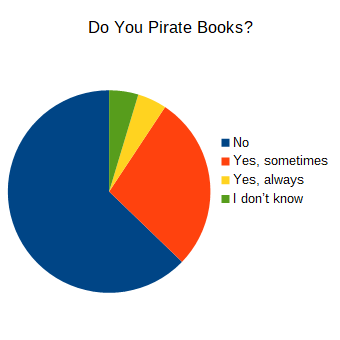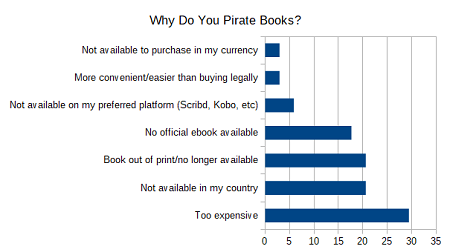
The results are in! Last month, I asked you to vote in my anonymous poll, and tell me whether or not you routinely pirate ebooks.
I purposely left the poll open for a really long time, to give as many of you as possible the opportunity to answer.
And now, dear reader, I present the results, for your reading pleasure:
Do You Pirate Books?

The first question I asked was a simple "Do You Pirate Books?" Everyone who filled out my survey answered this question. And here are the responses:
- No: 62.8%
- Yes, sometimes: 27.9%
- Yes, always: 4.7%
- I don't know: 4.7%
I must say, I'm pleased that only 32.6% of you pirate books in some form. Well, I say "pleased", but of course I'd rather that number was 0%. Still, it's lower than I expected.
On the other hand, we need to talk about something...
What do you mean, you don't know?!
Please don't take this the wrong way. I don't mean to poke fun at or offend anyone, but in 2019, with so much exposure around book piracy, it's difficult to imagine anybody being unaware that they're pirating a book.
Just in case, though, here are some rules of thumb:
Just in case, though, here are some rules of thumb:
- If an author or their publisher personally emails you one of their books, either in exchange for a review, or signing up for their email list, or because you entered a giveaway, it's not piracy (but note: if you're getting the book in exchange for an honest review, please do the right thing and write that review when you're done).
- Of course, copying that book and giving it to your friends, or uploading it to a file-sharing site, most definitely is piracy. The author/publisher agreed to give it to you. Not to anyone else.
- If you see a book for free on a website you've never heard of before, it's probably piracy. But just to be sure, you should search for that book on your favourite platform: Kobo, Google Play Books, Barnes & Noble, etc. If you find it on any of those sites, and it's not free, the website you've never heard of before is probably a pirate site.
- If you're ever in any doubt, look for a way to contact the author or publisher — you're sure to find a contact form or email address on their website. Until you hear back from them, err on the side of caution and don't download the book.
Why Do You Pirate Books?
Anyone who answered either "Always" or "Sometimes" to the question above got asked why they would pirate a book. There were loads of different options, and a place for people to enter ones I hadn't thought of.
Not all of the options were selected, so I've excluded them from the following chart. I also tried to sum up the various "Other" entries into these broad reasons:

- Too expensive to buy books legally: 29.4%
- Not available in my country: 20.6%
- Book out of print/no longer available: 20.6%
- No official ebook available: 17.6%
- Not available on my preferred platform (Scribd, Kobo, etc): 5.9%
- More convenient/easier than buying legally: 2.9%
- Not available to purchase in my currency: 2.9%
Note: people were allowed to choose more than one answer, so these totals might not add up to 100%.
Too expensive?
The top answer people gave for pirating books basically boiled down to the fact that it's too expensive to buy the ones they want legally, but they really want them, so they'd rather obtain them illegally.
On the one hand, it's not surprising that most people chose this option. Money is a topic that's high on everyone's list of priorities, and our knee-jerk reaction is often "I can't afford it." Besides, "too expensive" is a relative term, isn't it? Some people may baulk at spending anything over $4.99 for a book, while others would have no problem paying $12.99 or more for an ebook they really want. Then of course, if you know you can get something for free, even $0.99 might be too much to pay.
On the one hand, it's not surprising that most people chose this option. Money is a topic that's high on everyone's list of priorities, and our knee-jerk reaction is often "I can't afford it." Besides, "too expensive" is a relative term, isn't it? Some people may baulk at spending anything over $4.99 for a book, while others would have no problem paying $12.99 or more for an ebook they really want. Then of course, if you know you can get something for free, even $0.99 might be too much to pay.
On the other hand, pirating books hurts authors. And not just financially, either, since there's no guarantee you would've bought that book even if you could afford it. More importantly, it hurts authors emotionally, because it devalues their work.
When an author sees that their work is available on a pirate site, how would you expect them to react? Joyfully, because people want to read it so badly they're willing to pirate it? Or with intense sadness, disappointment, and anger, because people value that work so badly that they're only prepared to read it if they can get it for free? That they're not good enough to ever expect people to pay for their stories? Do you think such an author is likely to keep writing books in the long term?
I don't think so. Not one whit.
If you can't afford to buy a book, then rather not read it. Go find other, similar books which you can afford. These days, there's a plethora of affordable books on the Internet. Even free.
If you can't afford to buy a book, then rather not read it. Go find other, similar books which you can afford. These days, there's a plethora of affordable books on the Internet. Even free.
Check your local library. If, like me, you prefer to read ebooks, find out if your local library is available on OverDrive or one of the other ebook library distributors. If it is, request the book you want to read. If that book isn't available through the library partner your library supports, contact the author and ask them to add it. You'll make their day!
And if there's no chance of getting the book through the library, get hold of the author anyway. The vast majority of us — especially self-published authors — would be more than happy to send you a (legally) free copy of our books, in exchange for your promise to write an honest review and post it online somewhere. Contrary to you pirating the book, we'd be over the moon to hear from someone who wants to read our work so much that they're willing to seek us out!
Out of Print/No EBook Available?
If the book in question is out of print, and there's no "official" ebook version available, this is a bit trickier. Contact the author, if they're still alive. If they're not, see if you can find out who now owns the rights, or who last owned the rights, to it.
Ask them if they're willing to re-issue it as an ebook. Who knows? This might end up being a lucrative career for you if they ask you to handle it!
Not Available?
The remaining responses, I'm going to lump together into one basket, and call it "Not available where, when, and how I want to read it."
This is a problem. In the traditional publishing world, publishers still bid for rights to publish books in particular territories and not others. Your favourite book might be available in the United States, but not in South Africa. It's not just books that suffer from this phenomenon: movies and TV shows are notorious for it, In my opinion, this is an archaic, draconian practice that has no place in the twenty-first century.
But even today, self-published authors often fall into the trap of making their books exclusively available on one platform. It's not a country restriction, but it is a store restriction, and often a currency restriction. Most often, that platform is Amazon, to take advantage of various perks, including having their books available in the retailer's Kindle Unlimited program.
As I mentioned in my blog post on the subject, I do not support this in any way, shape, or form. It is my firm belief that books should be legally available to everyone, wherever they are, on whatever platform they choose, and for purchase in whatever currency they're most comfortable with.
But if any of those things aren't true of the book you want to read, I still don't think that's any justification for pirating it. My first advice is going to be the same as I've been giving all along: contact the author, and ask them to make the book available where you want to read it.
If they're unwilling or unable to do that, then find another book. In this day and age, there are so many places to consume books, and so many books out there, that there's no excuse for piracy.
And if you're looking for a place to (legally) read ebooks, free of charge, try Scribd. Click here to get 60 free days with the platform, to read as many ebooks, and listen to as many audiobooks, as your heart desires. And best of all, the authors get paid when you do.
If you find using a credit card inconvenient, Google Play Books even allows you to pay for books using the gift cards you can buy in your local brick-and-mortar store.
Granted, all of the above stores will make it difficult for you to read the books you buy on anything other than their own, proprietary ereading device or app. Enter Smashwords: while they don't support one-click ordering, you can download the books you've purchased to your computer or mobile device, to read on whichever app you prefer. They also support paying for books via PayPal, which means that you never have to share your credit card details with them.
Not convenient enough for you? Scribd also allows you to pay for their service via PayPal (once your 60 trial is up; make sure you click the link to claim that), and once you're subscribed, you don't ever have to buy an ebook ever again. If you find a book you want to read, you click "Read Now", with no friction whatsoever. What could be more convenient than that?!
Convenience?
The final reason people gave for pirating books, that I want to touch on, is the idea that piracy is more convenient than buying books legally. Well, I guess that depends on what you consider inconvenient, doesn't it? Amazon, Kobo, and Google Play Books (and I'm sure others do as well) all offer some version of one-click purchasing, where if your credit card is saved on their system, you can just click a button to buy any book, and have it available on your device in moments.If you find using a credit card inconvenient, Google Play Books even allows you to pay for books using the gift cards you can buy in your local brick-and-mortar store.
Granted, all of the above stores will make it difficult for you to read the books you buy on anything other than their own, proprietary ereading device or app. Enter Smashwords: while they don't support one-click ordering, you can download the books you've purchased to your computer or mobile device, to read on whichever app you prefer. They also support paying for books via PayPal, which means that you never have to share your credit card details with them.
Not convenient enough for you? Scribd also allows you to pay for their service via PayPal (once your 60 trial is up; make sure you click the link to claim that), and once you're subscribed, you don't ever have to buy an ebook ever again. If you find a book you want to read, you click "Read Now", with no friction whatsoever. What could be more convenient than that?!
Nope. With all the options available to you, there's simply no excuse for ebook piracy in 2019. None whatsoever. Now with that in mind, go out there and read more books!
No comments:
Post a Comment